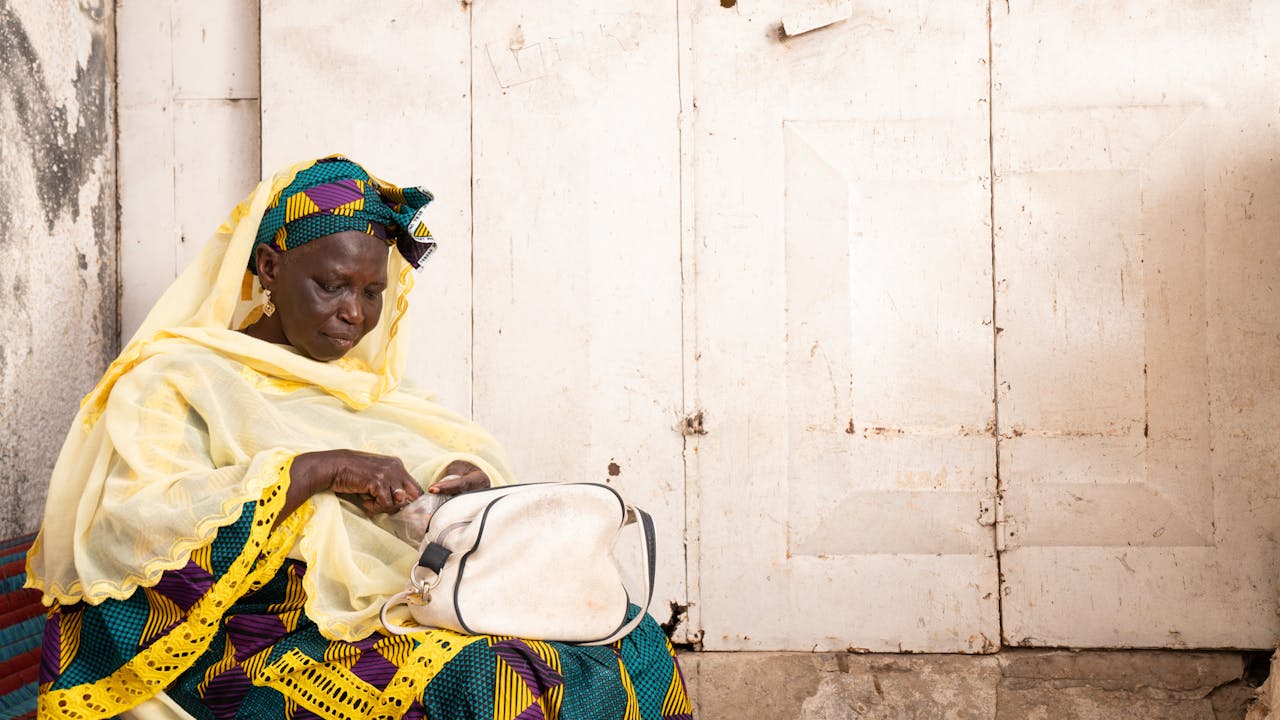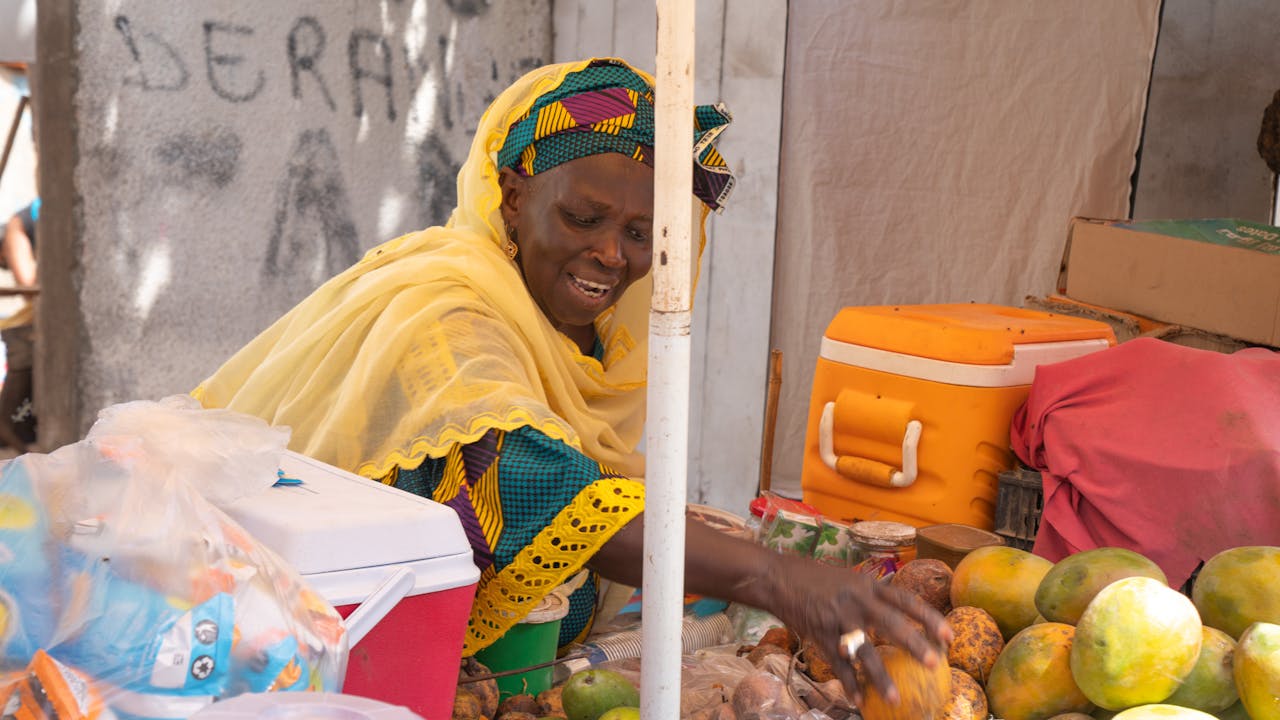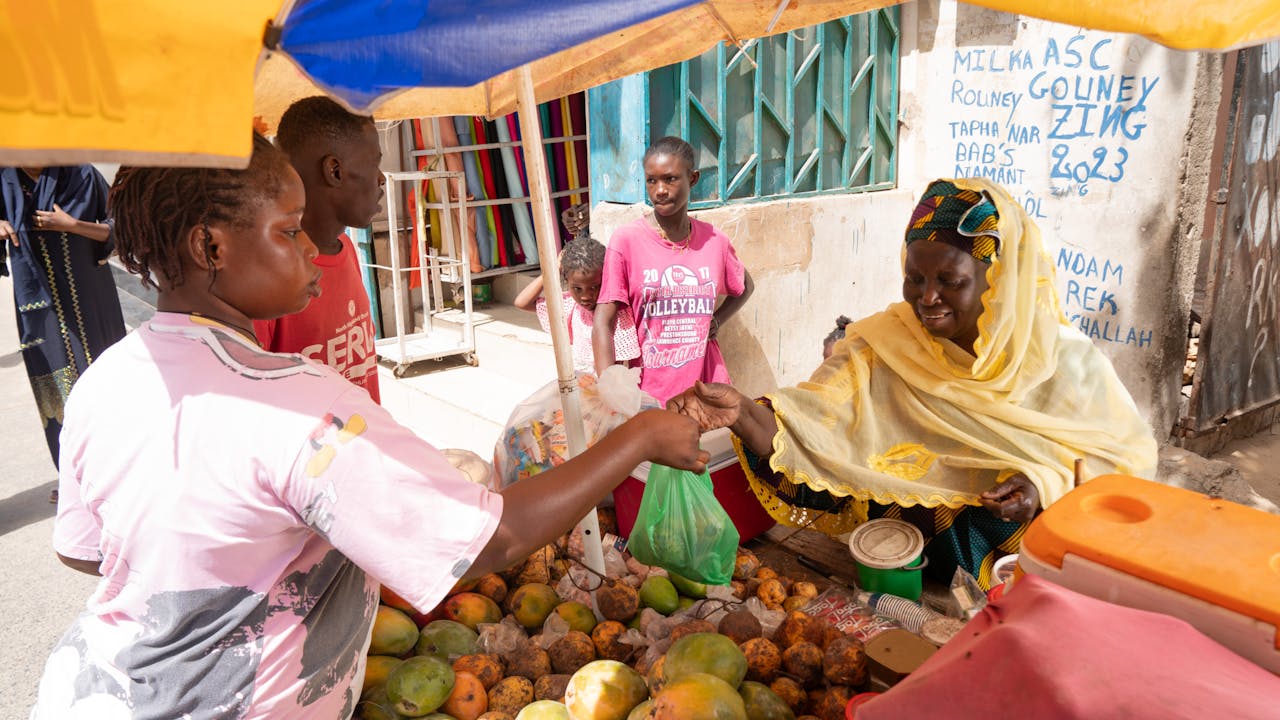For most of my life, I worked as a trader, buying and selling goods from different places. But some years ago, I was forced to stop my activity and take care of my husband when he fell ill. At that time, a family social protection benefit helped to ease my financial burden and allowed me to pay for school supplies and other basic needs for my children. Thanks to a recent increase in the benefit, I have also been able to grow my small fruit stand business.
My name is Astou Gningue. I am 73 years old and the mother of 10 children. I currently live in Pikine, in the Dakar region of Senegal and have done so for 51 years.
When I was much younger, I lived in a village. There, I used to raise goats and sell them. I also bought fabrics and sold them.
Later, when I married and came to Dakar, I continued the same activity. I used to go to Rosso, near Mauritania, and to Gambia to buy goods and fabrics and sell them back home.
I carried out my commercial activities because a wife must also help her husband to run the household. She cannot just sit back and expect everything from a man.
Some years ago, my husband became ill. He could no longer work, and my children were still very young. Then, all the burden fell on me.
During my husband's illness, I shuttled back and forth between the hospital and home. I couldn't leave him alone and therefore I had to stop my commercial activities.
My life was hard when I stopped working. I spent all my time worrying about feeding my children.
I started running a small business in front of my house, using the money I had saved from buying and selling fabrics. I would go to the market to buy fruits and other goods to sell.
I looked after my husband, and I managed as best I could to look after my children.
After my husband had been sick for some time, he was admitted to hospital. When he was discharged, he returned home. A year later, he passed away.
It was a difficult time.

Before receiving the family social protection benefit, I was in great difficulty. Long before that, I was financially independent, but when my husband became ill, I stopped working and things became complicated. Senegal (June, 2024)
© ILO/OIT Famara DiengThen one day, my son fell ill. I had to take care of him and could not work, I had no money. That's when one of my neighbours came to tell me that a family social protection benefit was available.
I went to the post office early in the morning. I waited in line until the afternoon, without getting paid. The next day, I went back to the post office at 4am and that day I received the social protection benefit.
That day, the family benefit was a great help.
One day, my son fell ill. I had to take care of him and could not work, I had no money. That's when one of my neighbours came to tell me that a family social protection benefit was available.

At that time, I had children who were students, and I had to pay for their schooling. Thanks to the social protection benefit, I was also able to buy school supplies for them.
Studying is very important in life. When I was young, I really wanted to go to school, but our locality didn't have a school.
The fact that I didn't go to school hurts me now. I run a women's association and, as I'm not educated, others must write for me. But I don't know if people faithfully translate what I say.

The social protection benefit has really helped. It allows me to build up my capital and better manage the extra expenses for my children. Senegal (June 2024)
© ILO/OIT Famara DiengAfter I received the family social protection benefit, I went to the market and stocked up on more mangoes and other fruit to resell. With the benefit, I have strengthened my activities.
Since I was a young girl, commerce has always fascinated me. I love to work. I got this passion from my parents, who worked all the time. They taught me that work is the only way to support yourself and be self-sufficient.
My mother farmed and raised sheep, goats, and cattle. I inherited my mother's culture of hard work. She worked until the day she died. I instilled these values in my children, without exception, both boys and girls.

Since I was a young girl, commerce has always fascinated me. When my husband passed away, it would have been difficult if I wasn't used to working. Senegal (June 2024)
© ILO/OIT Famara DiengI know a few recipients of the family social protection benefit.
Every Monday, as women beneficiaries, we get together to exchange ideas. We talk about the family benefit and how we use the money that we've received.
Recently, I received an increase in the family benefit. Now, we no longer receive 25,000 CFA francs (US$42). We receive 35,000 CFA francs (US$58) and it makes us even stronger. Thanks to the benefit increase, I've doubled the quantity of goods I buy.
I'm very happy with this increase because we now have more purchasing power. It has transformed our daily lives.
Thanks to the benefit increase, I've doubled the quantity of goods I buy. I'm very happy with this increase because we now have more purchasing power.

I've been through some very difficult times.
Today, some of my children work in commerce. One of my children works for the national electricity company and another one works at the town hall. The others are unemployed.
Some of them are also ill: my eldest son and the youngest. To this day, I continue to care for my children and receiving the family social protection benefit lightens my load.
